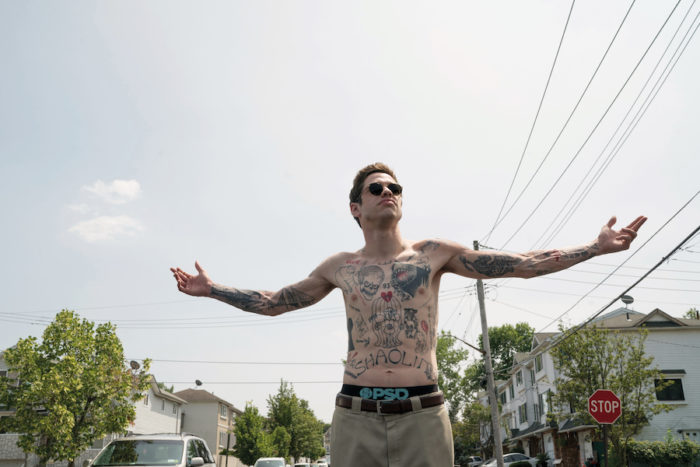The King of Staten Island review: Funny, dark, heartfelt – and too long
Review Overview
Catharsis
8Wit
5Brevity
4Mark Harrison | On 11, Jun 2020
Director: Judd Apatow
Cast: Pete Davidson, Marisa Tomei, Bill Burr, Bel Powley, and Steve Buscemi
Certificate: 15
On Saturday Night Live, Pete Davidson is something of an enigma. He’s very much the ensemble wildcard, often seen externalising his own issues through comedy, but best known for his nonplussed recurring character Chad, whose catchphrase is simply “OK!” He’s the latest comic actor to get a Judd Apatow-directed showcase and even though The King Of Staten Island is more dramatic than Knocked Up or Trainwreck, there’s a frustrating inevitability about the fact that it’s… OK.
Davidson plays 24-year-old Scott, a wannabe tattoo artist and stay-at-home bum who ping-pongs between anti-depressants and a multitude of more recreational drugs. Like Pete in real life, Scott lost his firefighter father at the age of 7 and, as sister Claire (Maude Apatow) puts it at one point, he has been “worrying everybody” ever since.
The film finds him and his mother Margie (Marisa Tomei) on their own after Claire heads off to college. When Scott’s acting-out brings another firefighter, Ray (Bill Burr), to their door, Margie finds new love, much to the dismay of her large adult son, whose grief keeps him fearful of expressing himself.
Davidson and his SNL writing partner Dave Sirus co-wrote the script with Apatow, and there’s a heavier-than-needed portion of the latter’s tendency towards improvisation. The director has admitted that he’s trying to make comedies with dramatic heft, in the tradition of Hal Ashby and James L Brooks, but as with most of his films since Knocked Up, Apatow shoots absolutely everything, improvisation and all, and then tries to keep as much of it in as possible.
That approach doesn’t work here, in a film where Scott and some of the supporting characters surrounding him are painted as obnoxiously as possible. Ultimately, the first 90 minutes severely dilutes the last 45, where the film really comes into its own. In no hurry to get to the point, the first section does offer a few big laughs, but they’re crammed in like off-cuts from Davidson and Sirus’ sketch-writing.
This also bleeds into the dramatic side of things – for every frank discussion about whether firefighters should have families, there’s a tortuous detour involving a pharmacy robbery. Through this kind of indulgence, the film’s funny and dark exploration of grief via the millennial milieu is severely undermined by the kind of formulaic man-child coming-of-age arc that Adam Sandler outgrew by the end of the 1990s.
All Apatovian bloating aside, the film’s final passage features a lot more of Burr and Steve Buscemi as a shrewd fire chief, and it’s marvellous. As Scott and the film accelerate towards some kind of catharsis, they earn back a whole lot of the goodwill burned up by the preceding acts.
The only thing that’s truly unforgivable by the end is how little it finds for the magnificent Bel Powley to do as Scott’s exasperated best-friend-with-benefits, but she comes back around before the end as well. For all of the film’s unearned sense of profundity, it’s Powley who gets the line that sums up the early slog: “This is what’s wrong with Staten Island. We’re stuck with the people from here.”
As always, length is a function of interest, but The King Of Staten Island is a great 100-minute character study that’s unaccountably 30 minutes longer. In his first starring role, Davidson remains a strangely compelling screen presence, from the jaw-dropping opening scene, (which promises a very different movie than the one we get) through to the final pay-off. However, like so several other Apatow vehicles, this showcase is a stretch limousine of a film – comfortable, but less manoeuvrable than most.
















